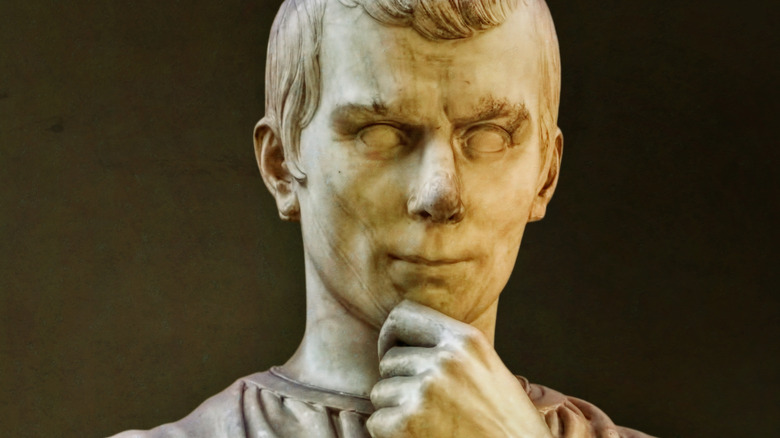Telltale Signs That Someone Has A Machiavellian Personality
Today, psycho-analyzing others seems to be more popular than ever. The term "gaslighting" is ubiquitous, while accusations of narcissism seem to be at an all-time high as people increasingly apply the term to anyone they deem unaligned with their own worldview. But as mental health terms continue to seep into popular culture, it's important to know the facts about what constitutes a certain personality type as well as a particular mental health disorder.
While the term "Machiavellian" does not refer to a mental health disorder, it does pertain to a personality type. The word itself comes from the Italian philosopher Niccolò Machiavelli, and generally denotes someone who uses manipulation to get what they want, or refers to the underhanded strategies employed by such a person.
Whether the Florentine himself would be pleased to know his name is forever linked to such undesirable traits remains debatable, as does whether Niccolò Machiavelli was really so Machiavellian himself — partly because the definition attached to the term is somewhat nebulous. But almost 500 years after the man's death in 1527, we are at least able to recognize the signs of a Machiavellian personality, even if the exact nature of this personality type remains complex.
The following article describes mental health issues.
What is a Machiavellian personality?
Belonging to the so-called "Dark Triad" — of what some scientists have termed a "dark factor" — which comprises narcissism, Machiavellianism, and psychopathy, Machiavellianism has been studied as a personality trait for some time. While the definition remains somewhat complex, generally the term is used to refer to those who use manipulation in their interpersonal relationships to attain some perceived advantage. It's also associated with a cynical worldview and an aloof demeanor.
Of course, recognizing these traits in the real-world doesn't necessarily point to a Machiavellian individual. Noting somebody's cynicism, for example, and concluding they had a Machiavellian personality would not only be misguided, it would overlook the complex nature of what it means to be Machiavellian, not to mention the fact that there are varying degrees of Machiavellianism. Plenty of people can be cynical without coming under the umbrella of the "Dark Triad," after all. But recent research shows that there are several key characteristics of a Machiavellian personality which can be helpful when trying to understand the term.
Emotional dysfunction is a sign of a Machiavellian personality
A study published in Frontiers In Psychology, entitled "What is the emotional core of the multidimensional Machiavellian personality trait?," aimed to investigate the socio-cognitive characteristics of Machiavellianism using a group of young people aged between 18 and 30. Researchers explored the emotional profile of Machiavellianism, providing a detailed insight into the personality trait that involves a complex mix of emotional issues.
Researchers found associations between Machiavellianism and high levels of alexithymia (a deficit in feeling, identifying, and expressing their own emotions), anhedonia (an inability to experience pleasure), depression, and anxiety. The findings matched other studies on the topic, too, building on decades of study that have helped build a robust understanding of the Machiavellian personality.
In the Frontiers study, Machiavellian individuals were shown to have significant emotional deficits that manifest as emotional detachment and dysfunction. Therefore, those with a Machiavellian personality will struggle to recognize emotions in themselves and others, and will appear aloof or detached due to the aforementioned anhedonia and depression. What's more, these individuals' inability to recognize and express their own emotions and their difficulties with feeling pleasure meant that they also struggled with empathy.
Machiavellian individuals struggle with empathy
If individuals with Machiavellian personalities are known for manipulating others, that might mean they are particularly adept at cognitive empathy, which is the ability to understand how other people think, as opposed to emotional or affective empathy, which involves feeling other people's emotions. However, it turns out that the real picture is more complicated.
As Yale psychologist Paul Bloom notes in The Boston Review, "Many popular treatments of psychopathy [...] see a lack of empathy as the core deficit in psychopathy. It is here that cognitive and emotional empathy come apart, because many people diagnosed with psychopathy are excellent at reading others' minds." You might expect the same to be true of those with Machiavellian personalities, but in fact it is the opposite way around.
The Frontiers In Psychology study showed a negative correlation between both cognitive and affective empathy in the brains of those with Machiavellian personalities — essentially meaning Machiavellian types struggle with both forms of empathy. This is a component of emotional dysfunction, with researchers noting that a lack of empathy appeared to stem from the aforementioned emotional issues. Anhedonia (the inability to feel pleasure), for example, seemed to lead to Machiavellian tendencies and less empathy in individuals. What's more, this lack of cognitive empathy was shown to be a big contributing factor to a cynical view of humanity. As Bloom also noted, "... there is considerable support for what the psychologist C. Daniel Batson calls 'the empathy-altruism hypothesis': when you empathize with others, you are more likely to help them." In the case of Machiavellian individuals, then, a lack of empathy makes them less likely to act altruistically and more likely to act, well, Machiavellian.
Machiavellian individuals demonstrate manipulative behavior
While emotional dysfunction appears to be at its root, Machiavellian behavior by itself is a much more obvious indicator of a Machiavellian personality. It might not be easy to determine whether someone is experiencing alexithymia, anhedonia, or depression. But if they act in an obviously manipulative way, that's a pretty big sign that they have a Machiavellian personality. In the Frontiers In Psychology study, researchers noted that because Machiavellian individuals appeared to judge human nature more negatively, they were also more inclined to use duplicitous strategies to get what they wanted. More specifically, the study states that these people are actually prompted to perform Machiavellian actions as a response to their dysfunctional social cognition.
This behavior has been proven extensively elsewhere, such as in two 2017 studies published in Europe's Journal of Psychology, both of which focused on women in relationships. The studies found that women with high levels of Machiavellianism were more likely to exhibit controlling behavior and emotional abuse. Another 2010 study in Social Psychology revealed that individuals with high scores on a Machiavellian scale disguised their selfishness and feigned altruism when surrounded by others, only to embrace their self-interest when alone.
It is important to note that Machiavellianism exists on a scale, and that not all people who exhibit Machiavellian behavior do so to the same extent or with the same frequency. It's also worth noting that it's not possible to conclusively identify someone as Machiavellian based on any one of the signs listed here. But taken together, they provide a fascinating picture of the Machiavellian personality.
If you or someone you know needs help with mental health, please contact the Crisis Text Line by texting HOME to 741741, call the National Alliance on Mental Illness helpline at 1-800-950-NAMI (6264), or visit the National Institute of Mental Health website.




